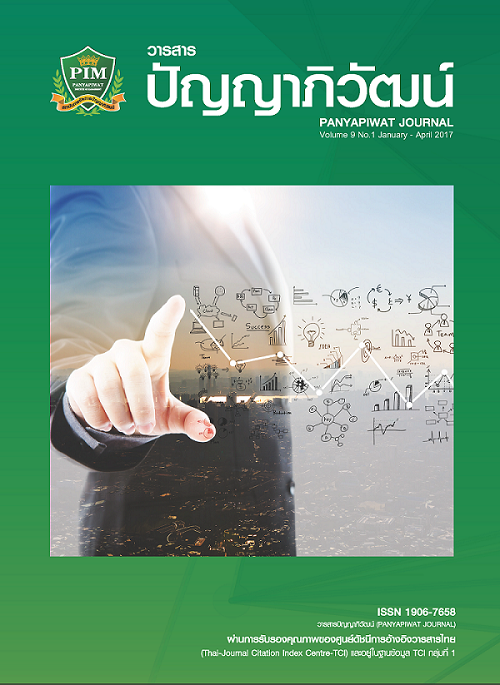ความคลุมเครือในบทบาท ความขัดแย้งในบทบาท และหน้าที่รับผิดชอบมากเกินไป ส่งผลต่อความตั้งใจลาออกจากงานของอาจารย์ในสถาบันอุดมศึกษาเอกชน
Main Article Content
บทคัดย่อ
การวิจัยครั้งนี้มีวัตถุประสงค์เพื่อศึกษาความคลุมเครือในบทบาท ความขัดแย้งในบทบาท และหน้าที่รับผิดชอบมากเกินไปที่ส่งผลต่อความตั้งใจลาออกจากงานของอาจารย์ในสถาบันอุดมศึกษาเอกชน การวิจัยครั้งนี้ใช้ระเบียบวิธีวิจัยเชิงปริมาณ โดยใช้แบบสอบถามกับกลุ่มตัวอย่างคือ อาจารย์ในสถาบันอุดมศึกษาเอกชนแห่งหนึ่ง จำนวน 140 คน พร้อมทั้งวิเคราะห์หาความสัมพันธ์ระหว่างตัวแปรอิสระโดยใช้ค่าสหสัมพันธ์เพียร์สันและวิเคราะห์อิทธิพลของตัวแปรด้วยการถดถอยเชิงพหุแบบนำเข้า ผลการวิจัยพบว่า ตัวแปรด้านความคลุมเครือในบทบาท และความขัดแย้งในบทบาท มีผลต่อความตั้งใจลาออกของอาจารย์ในสถาบันอุดมศึกษาเอกชน ที่ระดับนัยสำคัญที่ 0.05 พร้อมทั้งได้มีการอภิปราย สรุปผล รวมทั้งเสนอแนะการวิจัยในอนาคตด้วย
The objective of this study is role ambiguity role conflict and role overloads that affect turnover Intentions of lecturer in Private Higher Education Institutions. This research is a quantitative research methodology. The survey sample consisted of 140 lecturers in one Private Higher Education Institutions. In addition, relation between the independent variables was analyzed using Pearson’s correlation. Analysis of the influence of variables was done with Multiple Regressions Model. The results showed that role ambiguity and role conflict affecting turnover Intentions of lecturer in Private academic institutions at significance level of 0.05. Finally, the implications of the finding and suggestions for future research are presented.
Article Details
“ข้าพเจ้าและผู้เขียนร่วม (ถ้ามี) ขอรับรองว่า บทความที่เสนอมานี้ยังไม่เคยได้รับการตีพิมพ์และไม่ได้อยู่ระหว่างกระบวนการพิจารณาลงตีพิมพ์ในวารสารหรือแหล่งเผยแพร่อื่นใด ข้าพเจ้าและผู้เขียนร่วมยอมรับหลักเกณฑ์การพิจารณาต้นฉบับ ทั้งยินยอมให้กองบรรณาธิการมีสิทธิ์พิจารณาและตรวจแก้ต้นฉบับได้ตามที่เห็นสมควร พร้อมนี้ขอมอบลิขสิทธิ์บทความที่ได้รับการตีพิมพ์ให้แก่สถาบันการจัดการปัญญาภิวัฒน์หากมีการฟ้องร้องเรื่องการละเมิดลิขสิทธิ์เกี่ยวกับภาพ กราฟ ข้อความส่วนใดส่วนหนึ่งและ/หรือข้อคิดเห็นที่ปรากฏในบทความข้าพเจ้าและผู้เขียนร่วมยินยอมรับผิดชอบแต่เพียงฝ่ายเดียว”
เอกสารอ้างอิง
Akatchaeng, V. (2013). Factors that affect the intention of talents to leave the bureaucracy. WMS Journal of Management, 2(2), 47-58. [in Thai]
Arnold, H. T. & Feldman, D. C. (1986). Intergroups Conflict in Organization Behavior. New York: McGraw-Hill.
Chantharamano, S. & Pasunon, P. (2014).The study on factors affecting decision making for resignation of the staff of the office of the energy regulatory commission (OERC). Veridian E-Journal, 7(1), 525-541.[in Thai]
Chitasathian, S. (2007). Management in provincial public health organizations. Ph.D. Dissertation, Departmentof Public Administration, Faculty of Graduate Studies, Ramkhamhaeng University. [in Thai]
Cho, S., Johanson, M. M. & Guchait, P. (2009). Employees intent to leave: A comparison of determinants of intent to leave versus intent to stay. International Journal of Hospitality Management, 28(3), 374-381.
Cooper, C. L. & Strew, A. (1993). Successful stress management in a week. London: Hodder & Stoughton.
Cooper, C. L., Dewe, P. J. & O’Driscoll, M. P. (2001). Organizational Stress. Thousand Oaks, California: Sage.
Cooper, D. R., Schindler, P. S. & Sun, J. (2006). Business research methods (9th ed.). New York: McGraw-hill.
Cronk, T. et al. (1994). Human Resource Management. South Melbourne: Thomas Nelson.
Davis, A. J. (1989). Informed consent process in research protocols: Dilemmas for clinical nurses. West Journal Nurse Research, 11(4), 448-457.
Davis, K. & Newstrom, J. W. (1989). Organization Behavior: Human Behavior at Work (8th ed.). New York: McGraw-Hill.
Firth, L., Mellor, D. J., Moore, K. A. & Loquet, C. (2004). How can managers reduce employee intention to quit?. Journal of Managerial Psychology, 19(2), 170-187.
Glisson, C. & Hemmelgarn, A. (1998). The effects of organizational climate and interorganizational coordination on the quality and outcomes of children’s service systems. Child Abuse and Neglect, 22(5), 401-421.
Ha, N. N., Rattanajarana, S. & Sakulkoo, S. (2011). Effects of job stress, role conflict and role ambiguity on job satisfaction among staff nurses in Thai Nguyen provincial general hospitals, Vietnam. Retrieved December 25, 2015, from http://gsbooks.gs.kku.ac.th/54/grc12/files/rm_mmo6.pdf
Kahn, R., Wolfe, D., Quinn, R., Snoek, J. & Rosentbal, R. (1964). Organizational stress: Studies in role conflict and ambiguity. New York: Wiley.
Katz, D. & Kahn, R. L (1987). The Social Psychology of Organizations (2nd ed.). New York: John Wiley.
Kim, H. J., Knight, D. K. & Crutsinger, C. (2009). Generation Y employees’ retail work experience: The mediating effect of job characteristics. Journal of Business Research, 62(5), 548-556.
Klinkulap, P. (1990). Factors associated with disappointment in the performance of teachers in the region. Doctor of Education Program in Educational Administration, Graduate School, Srinakharinwirot University. [in Thai]
Krejcie, R. V. & Morgan, D. W. (1970). Determining Sample Size for Research Activities. Educational and Psychological Measurement, 30(3), 607-610.
Loetyingyot, S., Jadesadalug, V. & Sansook, J. (2015). Green Logistics Management Capabilities toward Stakeholders Responsiveness and Business Performance of Paper Industrial in Thailand. Journal of Business Administration, 38(147), 39-67. [in Thai]
Morris, C. (2004). Conflict analysis a tutorial. Retrieved July 3, 2014, from http://www.peacemakers.caMowday, R. T., Porter, L. W. & Steer, R. M. (1982). Employee organization linkage: The psychology of commitment, absenteeism and turnover. New York: Academic Press.
Mueangman, T. & Saengsuwan, S. (1997). Organizational behavior (2nd ed.). Bangkok: Thai Watana Panich. [in Thai]
Nadiri, H. & Tanova, C. (2010). An investigation of the role of justice in turnover intentions, job satisfaction, and organizational citizenship behavior in hospitality industry. International Journal of Hospitality Management, 29(1), 33-41.
Owens, R. G. (1995). Organizational Behavior in Education (5th ed.). Boston: Allyn and Bacon.Panyafu, N. (2008). The relationship between perceived work stress too notches in employment. Case Officer Bangkok Meatballs limited. Master of Science (Psychology), King Mongkut’s University of Technology North Bangkok. [in Thai]
Phuasiri, S. (2000). Factors influencing intention to resign from employment, industry case studies, production of finished tires. MS Thesis (Psychology), Graduate School, Kasetsart University. [in Thai]
Phukphun, C. (1992). A study of relationship between role conflicts and ambiguity and work satisfaction among educational technology personal in governmental universities. Bangkok: Thailand Thesis. [in Thai]
Rizzo, J. R., House, R. J. & Lirtzman, S. I. (1970). Role conflict and ambiguity in complex organizations. Administrative Science Quarterly, 15(2), 150-163.
Sisa-at, B. (2002). Preliminary research (7th ed.). Bangkok: Thai Wiriyasarn. [in Thai]
Steer, M. R. (1991). Introduction to Organization Behavior. New York: Harper Collin Publishers.
Tantrabandit, K. & Chotchakhonphan, K. (2010). The effect of perceived mentor support and perceived organizational support on employees’ affective commitment. Journal of Management Sciences, 9(2), 49-59. [in Thai]
Vroom, V. H. (1984). Work and motivation. Florida: Robert E, Krieger Publishing.
Wongsarat, T. & Sontirat, S. (2012). Predicting Variables to Burnout of Teachers under Nan Primary Educational Service Area Office 1. Journal of Social Sciences and Humanities, 38(2), 209-222.[in Thai]


